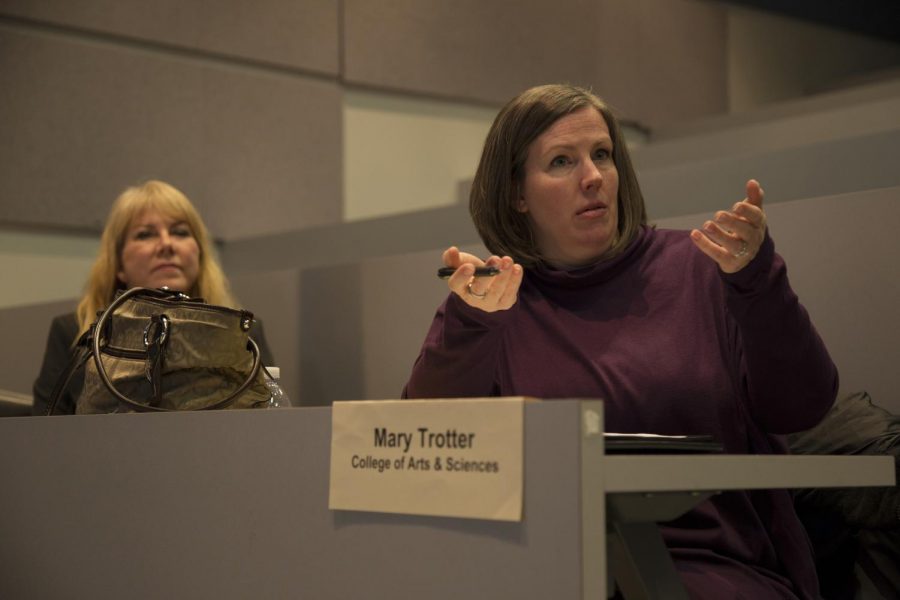Faculty hear INTO proposal
Admin say new program will bring in more international students, diversify university
ZACH RUBIO | The Daily Evergreen
Mary Trotter expressing her ever growing concerns regarding WSU’s budget deficit, Thursday evening.
January 12, 2018
The year’s first Faculty Senate meeting focused on a plan to enroll more international students and the Performing Arts program’s future.
Asif Chaudhry, vice president of International Programs, spoke to the Senate about WSU’s strategy to increase revenue by enrolling more international students through a program called INTO. The program is a collaboration between the Office of International Programs and the Office of the Provost.
Chaudhry said INTO’s objective is to improve and increase diversity, globalize the university and advance the “Drive to 25.”
“Everything [is] to set students up for achievement,” Chaudhry said. “We have that done.”
He noted that in fall of 2017, INTO brought in 116 new students to their Pathway program, which combines academic skill and English language development. It also brought in 130 students this semester despite a shorter recruiting period.
“We are well on our way to achieve the diversity we want to achieve,” Chaudhry said, adding that students already in the program are performing well.
“It’s really been a leap of faith,” Vice Provost for Academic Affairs Erica Austin said, while thanking the Senate and the university administration for their work. “It’s really gone well and we’ve learned a lot from the last semester.”
Chaudhry and Austin presented data to the Senate, showing WSU INTO spring confirmations were greater by 10 students than INTO’s leading partner Oregon State University.
Data also showed the cumulative GPA for INTO undergraduate students was 3.3, the third highest in comparison to Oregon State University at 3.12, University of South Florida at 3.43 and Colorado State University at 3.56.
One faculty senator was concerned INTO students were held to different standards than other students. Chaudhry and Austin explained the program is designed to allow students to enter as non-degree-seeking and gives them the opportunity to prove themselves as degree-seeking.
Chaudhry also addressed the trend of fewer international students enrolling in universities nationwide.
“[That is] my biggest concern,” Chaudhry said. “Something that I follow very closely.”
He said INTO is an effective way to maintain international students, and he believes they can continue to be successful if they do not lower their standards or displace domestic students.
Discussion about the Performing Arts’ buildings occupied the rest of the meeting.
After its last performance in April, the Performing Arts program will be eliminated as part of President Kirk Schulz’s “fiscal health” initiative to curb WSU’s $30 million deficit. Schulz’s initiative also called for 2.5 percent spending cuts university-wide and avoiding hiring to fill vacant positions.
Clinical Associate Professor Mary Trotter read an email from Clinical Associate Professor Benjamin Gonzales that expressed his concern over what will happen to the current Performing Arts buildings.
“No one has yet to hear, from anyone, what is happening with these spaces currently being stewarded by WSU Performing Arts, Jones and Wadleigh Theatres, in particular,” Gonzales wrote.
The letter also addressed the elimination of the Performing Arts program.
“We were portrayed as not programmatically self-sustainable,” Gonzales wrote, “but our unit can prove this was blatantly untrue.”
Trotter expressed her frustration as well and said no one seems to have answers to any questions, saying the Faculty Senate could improve on getting more specific answers, preferably within a month. She said she understands these things take time, but she also believes it is fair to want answers.
However, she said, she is happy to see her fellow senators asking the questions that needed to be asked.
“We deserve more, our constituents deserve more, our students deserve more,” Trotter said. “We at some point have to demand more.”
















